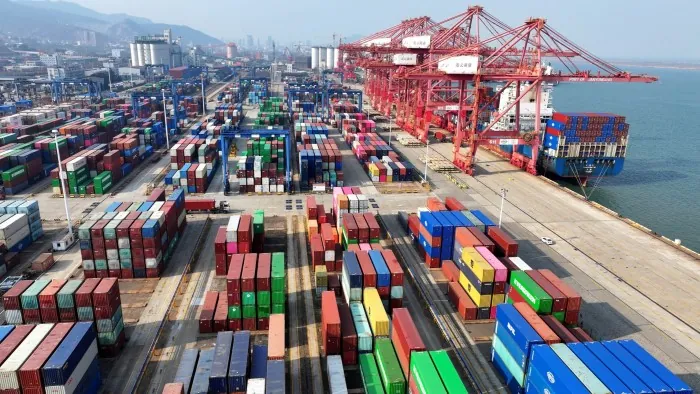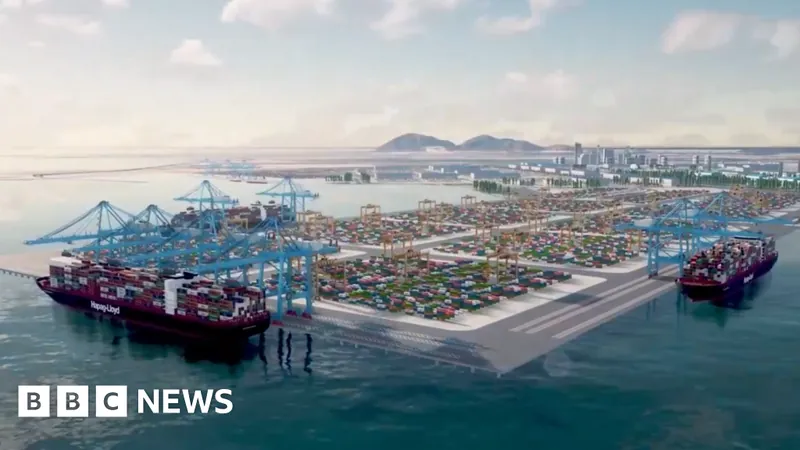
Xi Jinping Declares China as the World’s ‘Growth Engine’ Amid Economic Challenges
2024-12-10
Author: Ting
Introduction
In a bold statement, Chinese President Xi Jinping asserted that China is committed to achieving a 5% GDP growth target for this year, reinforcing its position as a major engine of global economic expansion. This declaration comes as the Chinese government intensifies efforts to revitalize waning investor confidence amidst ongoing economic challenges.
Recent Policy Shifts
Xi’s remarks followed a significant policy shift, as China's leaders announced an easing of monetary policy for the first time in 14 years. This move is aimed at addressing the persistent issues of subdued consumption and deflation in the world's second-largest economy. The decision has had an immediate impact, with Chinese stocks seeing an uptick; the CSI 300 index climbed as much as 3.3% before settling for a 0.7% gain by the end of the trading day.
Investor Reactions
As investors reacted favorably, the yields on China’s benchmark 10-year government bonds dipped to a record low of 1.86%, indicating increased market speculation on potential interest rate cuts from the central bank.
Confidence in Economic Growth
During a gathering in Beijing, which included prominent figures like IMF Managing Director Kristalina Georgieva and World Bank President Ajay Banga, Xi emphasized, “China has full confidence in achieving this year’s economic growth target and continuing to play its role as the world’s largest economic growth engine.”
Need for Concrete Actions
Investors are eager for more concrete actions from Beijing to stimulate consumer demand, particularly as recent trade data pointed to a 3.9% year-on-year decline in imports—reflecting weak domestic demand. Additionally, consumer prices showed a mere 0.2% increase year-on-year, heightening concerns about deflation.
Market Insights
Zhiwei Zhang of Pinpoint Asset Management commented on the market's reaction to the recent politburo meeting, stating it indicated a likely push for enhanced domestic demand next year. Investors are now awaiting detailed plans from the government on how to navigate these economic headwinds.
Exports vs. Imports
Despite the decline in imports, China's exports saw a modest increase of 6.7% year-on-year in November, falling short of analysts' predictions. However, experts from Capital Economics argue that this slowdown does not signify the end of China's export boom, anticipating a rebound tied to competitive advantages and pre-emptive actions against tariffs.
Upcoming Economic Agenda
As China prepares for the Central Economic Work Conference later this month—an important meeting to shape the economic agenda for the upcoming year—investors are hopeful for a clearer strategy to promote domestic consumption affected by a sluggish property market.
Trade Relations with the US
Moreover, China's trade dynamics are under scrutiny as the country braces for potential shifts stemming from Donald Trump’s recent electoral victory, which has sparked fears of increased tariffs. Notably, China's trade surplus with the US expanded to $34.9 billion in November, up from $33.5 billion the previous month.
Dialogue with the US
Xi reiterated China's commitment to constructive dialogue with the US, stating, “China is willing to maintain dialogue, expand cooperation, manage differences and promote the development of China-US relations in a stable, healthy, and sustainable direction.” He criticized the notion of “tariff wars, trade wars, and technology wars,” asserting the need to uphold China's sovereignty and development interests.
Future Measures
On the path forward, the politburo has pledged to adopt extraordinary measures to stimulate growth and stabilize both the stock and property markets, alongside a promise for a more proactive fiscal policy aimed at bolstering consumption in the face of economic challenges.
Conclusion
China's strategic approach in the coming weeks will be critical, not only for its own economy but also for the global economy as a whole, particularly in a climate marked by uncertainty and shifting geopolitical dynamics.



 Brasil (PT)
Brasil (PT)
 Canada (EN)
Canada (EN)
 Chile (ES)
Chile (ES)
 España (ES)
España (ES)
 France (FR)
France (FR)
 Hong Kong (EN)
Hong Kong (EN)
 Italia (IT)
Italia (IT)
 日本 (JA)
日本 (JA)
 Magyarország (HU)
Magyarország (HU)
 Norge (NO)
Norge (NO)
 Polska (PL)
Polska (PL)
 Schweiz (DE)
Schweiz (DE)
 Singapore (EN)
Singapore (EN)
 Sverige (SV)
Sverige (SV)
 Suomi (FI)
Suomi (FI)
 Türkiye (TR)
Türkiye (TR)